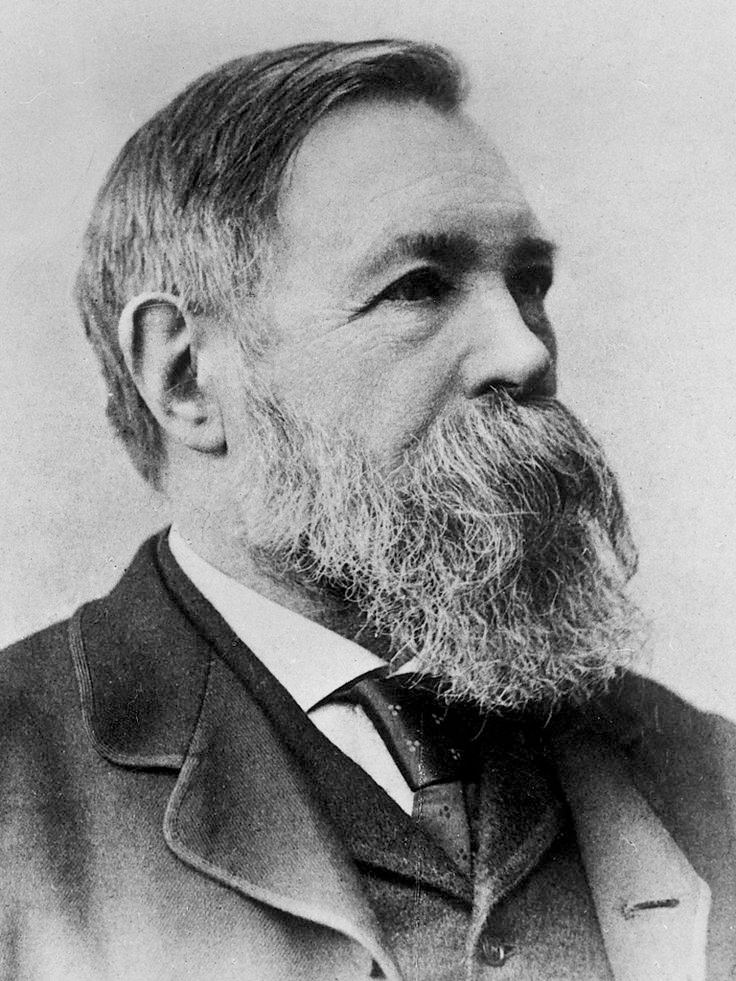Engels, Frederick, socialist, born in Barmen on Nov. 28, 1820, the son of a well-to-do manufacturer. Took up commerce, but already at an early age began propagating radical and socialist ideas in newspaper articles and speeches. After working for some time as a clerk in Bremen and serving for one year as an army volunteer in Berlin in 1842, he went for two years to Manchester, where his father was co-owner of a cotton mill.
In 1844 he worked for the Deutsch-Französische Jahrbücher published by Arnold Ruge and Karl Marx in Paris. In 1844 he returned to Barmen and in 1845 addressed communist meetings organised by Moses Hess and Gustav K?ttgen in Elberfeld. Then, until 1848, he lived alternately in Brussels and Paris; in 1846 he joined, with Marx, the secret Communist League, a predecessor of the International, and represented the Paris communities at the two League congresses in London in 1847. On the League's instructions, he wrote, jointly with Marx, the Communist Manifesto addressed to the "working men of all countries", which was published shortly before the February revolution [1848] (a new edition appeared in Leipzig in 1872).
In 1848 and 1849 E. worked in Cologne for the Neue Rheinische Zeitung edited by Marx, and after its suppression he contributed, in 1850, to the Politisch-oekonomische Revue. He witnessed the uprisings in Elberfeld, the Palatinate and Baden and took part in the Baden-Palatinate campaign as aide-de-camp in Willich's volunteer corps. After the suppression of the Baden uprising E. returned as a refugee to England and re-entered his father's firm in Manchester in 1850.
He retired from business in 1869 and has lived in London since 1870. He assisted his friend Marx in providing support for the international labour movement, which arose in 1864, and in carrying on social-democratic propaganda. E. was Secretary for Italy, Spain and Portugal on the General Council of the International. He advocates Marxian communism in opposition to both "petty bourgeois" Proudhonist and nihilistic Bakuninist anarchism. His main work is The Condition of the Working-Class in England (Leipzig, 1845; new edition, Stuttgart, 1892), which, although one-sided, possesses undeniable scientific value. His Anti-Dühring is a polemic of considerable size (2nd ed. Zurich, 1886). E.'s other published works include Ludwig Feuerbach and the End of Classical German Philosophy (Stuttgart, 1888), The Origin of the Family Socialism: Utopian and Scientific (4th ed., Berlin, 1891). E. also published Vols 2 and 3 of Karl Marx's Capital and the 3rd and 4th editions of Vol. I, and contributed many articles to the Neue Zeit.
Megathreads and spaces to hang out:
- ❤️ Come listen to music and Watch movies with your fellow Hexbears nerd, in Cy.tube
- 💖 Come talk in the New Weekly Queer thread
- 💛 Read and talk about a current topics in the News Megathread
- 💚 Come and talk in the Daily Bloomer Thread
- ⭐️ September Movie Nominations ⭐️
reminders:
- 💚 You nerds can join specific comms to see posts about all sorts of topics
- 💙 Hexbear’s algorithm prioritizes comments over upbears
- 💜 Sorting by new you nerd
- 🌈 If you ever want to make your own megathread, you can reserve a spot here nerd
- 🐶 Join the unofficial Hexbear-adjacent Mastodon instance toots.matapacos.dog
Links To Resources (Aid and Theory):
Aid:
Theory:



I’ve been reading a lot about neoliberalism, mainly from Wendy Brown and David Harvey, and they describe how neoliberalism has convinced people to apply “market rationality” to every aspect of their lives, re: investing in yourself (e.g., human capital), cost-benefit analysis of everyday decisions, min-maxing, productivity fetishism, etc….
A thought I had today was about how social media, at least under neoliberal capitalism, has encouraged so many people to think of themselves and their actions through the lens of “content”… just like how every personal decision under neoliberalism has to be justified in economic terms, now there is a “content-ification” of major parts of our lives
Both dehumanize along similar lines, but through different ways I guess. Has anyone written about this, like in a blog or a book?
I dont editorialize my social media presence at all, its all private as possible and as candid as possible fuck that
Yeah, that's fair. It's odd because that's how my main socials work, but I have a side-gig kinda thing that relies on "content-ifying" me and my thang, so it creates a lot of cognitive dissonance for me :(
i would argue that it is actually the exact same mechanism. turning your social media presence into "content" ie "productive" value is the exact same thing as min-maxing your spare time. it is the natural ideology of the petty bourgeois to prefer to "self-exploit" than be exploited by others and carries the same irony and tragedy.
Yeah, that's very true, thank you. Social media is really just offering new ways for people to commodify themselves
It's a shame. In some ways it really democratized media. In theory, at least before monetization went in to hyperdrive, anyone with a camera and an internet connection could make their own little public access channel.